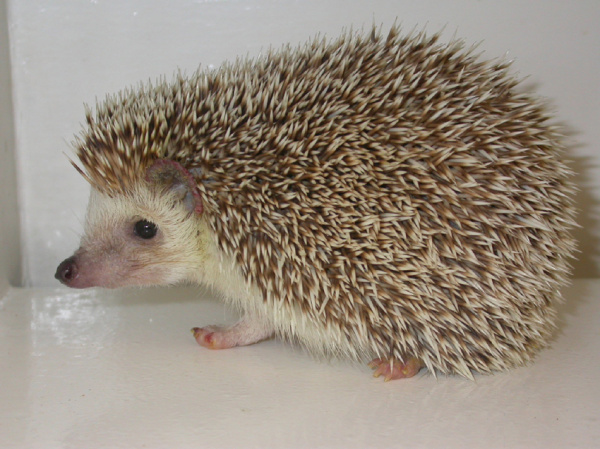Hedgehogs - Problems
General Information
Hedgehogs have several unique problems Understanding these problems will allow you to better care for your pet and minimize future health care problems. TEST.
Cancer
"Cancer is very prevalent in hedgehogs, especially those over 3 years old."
Cancer is very prevalent in hedgehogs, especially those over 3 years old. Tumors have been reported in all body organs in hedgehogs, but are especially common in the mouth and gastrointestinal tract. Signs are often vague and non-specific, including weight loss, loss of appetite, and lethargy. Treatment such as surgical removal can be attempted, but is not usually successful, as the cancer is often very advanced at the time of diagnosis.
Obesity
"One sure sign that your hedgehog is too fat is when it balls up you can still see the face, ears or feet."
With hedgehogs, the food often has to be rationed to prevent obesity. Inappropriate or imbalanced diets may lead to obesity and malnutrition. One sure sign that your hedgehog is too fat is when it balls up you can still see the face, ears or feet. Normally, a balled up hedgehog is completely enclosed by its' spines.
Eye problems
Hedgehogs are particularly prone to eye injuries and corneal ulcers. Diagnosis is the same as in any animal but effective treatment is compromised as hedgehogs ball up and hide their faces. Due to their heightened sense of hearing and smell, blind hedgehogs seem to get along just fine.
Dental disease
Tartar, gingivitis and periodontal disease are common in hedgehogs, as are oral tumors. Signs of dental problems include anorexia (not eating), halitosis, visible blood around the mouth, and pawing at the mouth. A general anesthetic will allow a thorough oral examination, x-rays, dental cleaning or extractions as deemed necessary.
Foot necrosis
Hedgehogs will commonly present with human hair wrapped around one or more feet, particularly when one of the owners has long hair. Our hairs fall out periodically and end up on the floor where they can easily get wrapped around the foot of a roaming hedgehog. The hair may constrict the foot or restrict circulation so much that the foot may become necrotic or dead. This problem is easily missed as the feet are often tucked under the body or hidden in the cloak of the spiny body covering. Surgical amputation may be necessary if severe foot necrosis occurs, especially if it is not detected immediately.
Oral foreign objects
Hard food like carrot pieces or peanut halves can get lodged in the roof of the mouth. Signs of this problem include anorexia (not eating), decreased appetite, and pawing at the mouth. A general anesthetic is needed to diagnose the problem and dislodge the foreign object.
Examination Difficulties
Hedgehogs commonly "ball up" when handled. This is a normal defensive reaction and makes an examination by your veterinarian difficult if not impossible.
"Most hedgehogs will require anesthesia for even a simple examination."
Most hedgehogs will require anesthesia for even a simple examination. While there is always a small risk with anesthesia, the risk of death is greater if a thorough examination and needed tests [such as blood tests or radiographs (X-rays)] are not performed to properly diagnose and treat your pet. Using a gas anesthetic such as isoflurane is reasonably safe and allows the examination and any necessary diagnostic testing to proceed safely for both your pet and the doctor!






